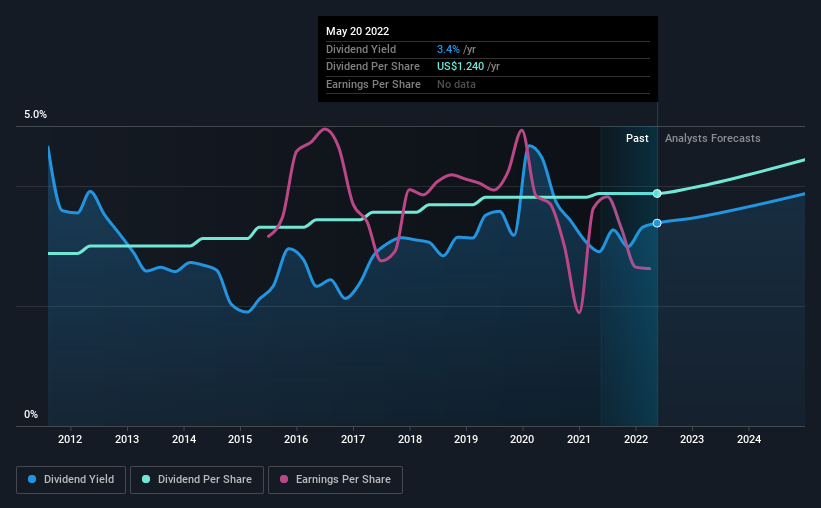Don't Buy HNI Corporation (NYSE:HNI) For Its Next Dividend Without Doing These Checks
HNI Corporation (NYSE:HNI) stock is about to trade ex-dividend in 4 days. The ex-dividend date occurs one day before the record date which is the day on which shareholders need to be on the company's books in order to receive a dividend. The ex-dividend date is important because any transaction on a stock needs to have been settled before the record date in order to be eligible for a dividend. Therefore, if you purchase HNI's shares on or after the 26th of May, you won't be eligible to receive the dividend, when it is paid on the 8th of June.
The company's next dividend payment will be US$0.32 per share. Last year, in total, the company distributed US$1.24 to shareholders. Based on the last year's worth of payments, HNI has a trailing yield of 3.4% on the current stock price of $36.68. Dividends are a major contributor to investment returns for long term holders, but only if the dividend continues to be paid. We need to see whether the dividend is covered by earnings and if it's growing.
View our latest analysis for HNI
Dividends are typically paid out of company income, so if a company pays out more than it earned, its dividend is usually at a higher risk of being cut. HNI paid out 91% of its earnings, which is more than we're comfortable with, unless there are mitigating circumstances. Yet cash flows are even more important than profits for assessing a dividend, so we need to see if the company generated enough cash to pay its distribution. Over the last year, it paid out dividends equivalent to 214% of what it generated in free cash flow, a disturbingly high percentage. Our definition of free cash flow excludes cash generated from asset sales, so since HNI is paying out such a high percentage of its cash flow, it might be worth seeing if it sold assets or had similar events that might have led to such a high dividend payment.
Cash is slightly more important than profit from a dividend perspective, but given HNI's payments were not well covered by either earnings or cash flow, we are concerned about the sustainability of this dividend.
Click here to see the company's payout ratio, plus analyst estimates of its future dividends.
Have Earnings And Dividends Been Growing?
When earnings decline, dividend companies become much harder to analyse and own safely. If earnings fall far enough, the company could be forced to cut its dividend. With that in mind, we're discomforted by HNI's 6.3% per annum decline in earnings in the past five years. When earnings per share fall, the maximum amount of dividends that can be paid also falls.
Another key way to measure a company's dividend prospects is by measuring its historical rate of dividend growth. Since the start of our data, 10 years ago, HNI has lifted its dividend by approximately 3.0% a year on average. That's intriguing, but the combination of growing dividends despite declining earnings can typically only be achieved by paying out a larger percentage of profits. HNI is already paying out 91% of its profits, and with shrinking earnings we think it's unlikely that this dividend will grow quickly in the future.
Final Takeaway
From a dividend perspective, should investors buy or avoid HNI? Not only are earnings per share declining, but HNI is paying out an uncomfortably high percentage of both its earnings and cashflow to shareholders as dividends. This is a starkly negative combination that often suggests a dividend cut could be in the company's near future. It's not the most attractive proposition from a dividend perspective, and we'd probably give this one a miss for now.
With that in mind though, if the poor dividend characteristics of HNI don't faze you, it's worth being mindful of the risks involved with this business. To that end, you should learn about the 3 warning signs we've spotted with HNI (including 1 which doesn't sit too well with us).
A common investing mistake is buying the first interesting stock you see. Here you can find a full list of high-yield dividend stocks.
Have feedback on this article? Concerned about the content? Get in touch with us directly. Alternatively, email editorial-team (at) simplywallst.com.
This article by Simply Wall St is general in nature. We provide commentary based on historical data and analyst forecasts only using an unbiased methodology and our articles are not intended to be financial advice. It does not constitute a recommendation to buy or sell any stock, and does not take account of your objectives, or your financial situation. We aim to bring you long-term focused analysis driven by fundamental data. Note that our analysis may not factor in the latest price-sensitive company announcements or qualitative material. Simply Wall St has no position in any stocks mentioned.

